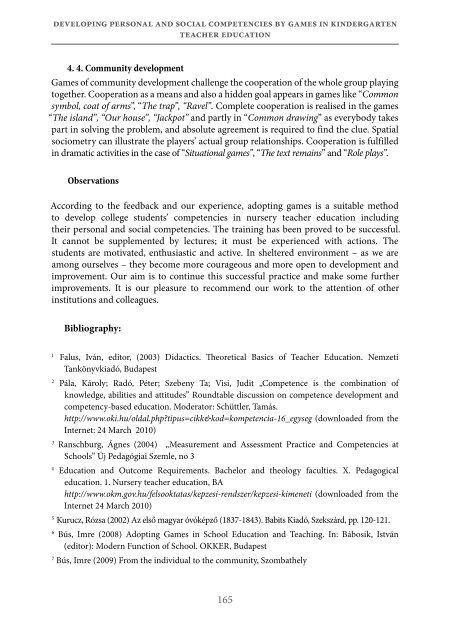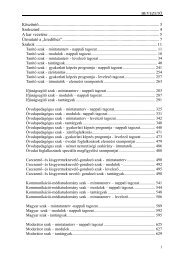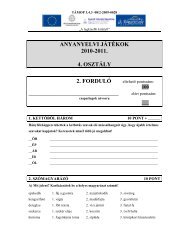ACTA SZEKSZARDIENSIUM - Pécsi Tudományegyetem Illyés Gyula ...
ACTA SZEKSZARDIENSIUM - Pécsi Tudományegyetem Illyés Gyula ...
ACTA SZEKSZARDIENSIUM - Pécsi Tudományegyetem Illyés Gyula ...
Create successful ePaper yourself
Turn your PDF publications into a flip-book with our unique Google optimized e-Paper software.
developing personal and social competencies by games in kindergarten<br />
teacher education<br />
4. 4. Community development<br />
Games of community development challenge the cooperation of the whole group playing<br />
together. Cooperation as a means and also a hidden goal appears in games like “Common<br />
symbol, coat of arms”, “The trap”, “ravel”. Complete cooperation is realised in the games<br />
“The island”, “our house”, “Jackpot” and partly in “Common drawing” as everybody takes<br />
part in solving the problem, and absolute agreement is required to find the clue. Spatial<br />
sociometry can illustrate the players’ actual group relationships. Cooperation is fulfilled<br />
in dramatic activities in the case of “Situational games”, “The text remains” and “role plays”.<br />
Observations<br />
According to the feedback and our experience, adopting games is a suitable method<br />
to develop college students’ competencies in nursery teacher education including<br />
their personal and social competencies. The training has been proved to be successful.<br />
It cannot be supplemented by lectures; it must be experienced with actions. The<br />
students are motivated, enthusiastic and active. In sheltered environment – as we are<br />
among ourselves – they become more courageous and more open to development and<br />
improvement. Our aim is to continue this successful practice and make some further<br />
improvements. It is our pleasure to recommend our work to the attention of other<br />
institutions and colleagues.<br />
Bibliography:<br />
1 Falus, Iván, editor, (2003) Didactics. Theoretical Basics of Teacher Education. Nemzeti<br />
Tankönyvkiadó, Budapest<br />
2 Pála, Károly; Radó, Péter; Szebeny Ta; Visi, Judit „Competence is the combination of<br />
knowledge, abilities and attitudes” Roundtable discussion on competence development and<br />
competency-based education. Moderator: Schüttler, Tamás.<br />
http://www.oki.hu/oldal.php?tipus=cikk&kod=kompetencia-16_egyseg (downloaded from the<br />
Internet: 24 March 2010)<br />
3 Ranschburg, Ágnes (2004) „Measurement and Assessment Practice and Competencies at<br />
Schools” Új Pedagógiai Szemle, no 3<br />
4 Education and Outcome Requirements. Bachelor and theology faculties. X. Pedagogical<br />
education. 1. Nursery teacher education, BA<br />
http://www.okm.gov.hu/felsooktatas/kepzesi-rendszer/kepzesi-kimeneti (downloaded from the<br />
Internet 24 March 2010)<br />
5 Kurucz, Rózsa (2002) Az első magyar óvóképző (1837-1843). Babits Kiadó, Szekszárd, pp. 120-121.<br />
6 Bús, Imre (2008) Adopting Games in School Education and Teaching. In: Bábosik, István<br />
(editor): Modern Function of School. OKKER, Budapest<br />
7 Bús, Imre (2009) From the individual to the community, Szombathely<br />
165




